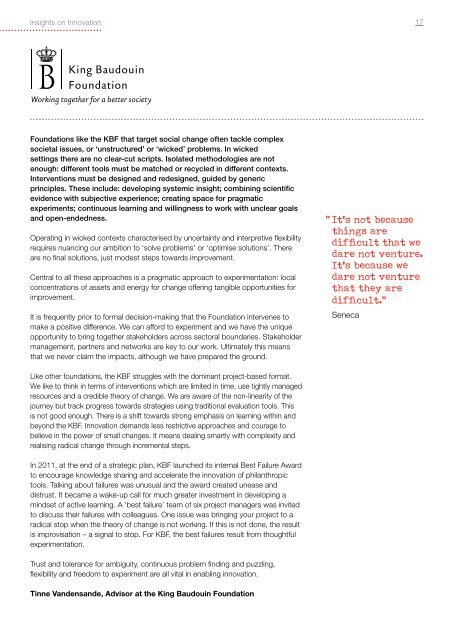O0YQ5
O0YQ5
O0YQ5
Create successful ePaper yourself
Turn your PDF publications into a flip-book with our unique Google optimized e-Paper software.
Insights on Innovation<br />
17<br />
Foundations like the KBF that target social change often tackle complex<br />
societal issues, or ‘unstructured’ or ‘wicked’ problems. In wicked<br />
settings there are no clear-cut scripts. Isolated methodologies are not<br />
enough: different tools must be matched or recycled in different contexts.<br />
Interventions must be designed and redesigned, guided by generic<br />
principles. These include: developing systemic insight; combining scientific<br />
evidence with subjective experience; creating space for pragmatic<br />
experiments; continuous learning and willingness to work with unclear goals<br />
and open-endedness.<br />
Operating in wicked contexts characterised by uncertainty and interpretive flexibility<br />
requires nuancing our ambition to ‘solve problems’ or ‘optimise solutions’. There<br />
are no final solutions, just modest steps towards improvement.<br />
Central to all these approaches is a pragmatic approach to experimentation: local<br />
concentrations of assets and energy for change offering tangible opportunities for<br />
improvement.<br />
It is frequently prior to formal decision-making that the Foundation intervenes to<br />
make a positive difference. We can afford to experiment and we have the unique<br />
opportunity to bring together stakeholders across sectoral boundaries. Stakeholder<br />
management, partners and networks are key to our work. Ultimately this means<br />
that we never claim the impacts, although we have prepared the ground.<br />
" It's not because<br />
things are<br />
<br />
dare not venture.<br />
It's because we<br />
dare not venture<br />
that they are<br />
<br />
Seneca<br />
Like other foundations, the KBF struggles with the dominant project-based format.<br />
We like to think in terms of interventions which are limited in time, use tightly managed<br />
resources and a credible theory of change. We are aware of the non-linearity of the<br />
journey but track progress towards strategies using traditional evaluation tools. This<br />
is not good enough. There is a shift towards strong emphasis on learning within and<br />
beyond the KBF. Innovation demands less restrictive approaches and courage to<br />
believe in the power of small changes. It means dealing smartly with complexity and<br />
realising radical change through incremental steps.<br />
In 2011, at the end of a strategic plan, KBF launched its internal Best Failure Award<br />
to encourage knowledge sharing and accelerate the innovation of philanthropic<br />
tools. Talking about failures was unusual and the award created unease and<br />
distrust. It became a wake-up call for much greater investment in developing a<br />
mindset of active learning. A ‘best failure’ team of six project managers was invited<br />
to discuss their failures with colleagues. One issue was bringing your project to a<br />
radical stop when the theory of change is not working. If this is not done, the result<br />
is improvisation – a signal to stop. For KBF, the best failures result from thoughtful<br />
experimentation.<br />
Trust and tolerance for ambiguity, continuous problem finding and puzzling,<br />
flexibility and freedom to experiment are all vital in enabling innovation.<br />
Tinne Vandensande, Advisor at the King Baudouin Foundation


